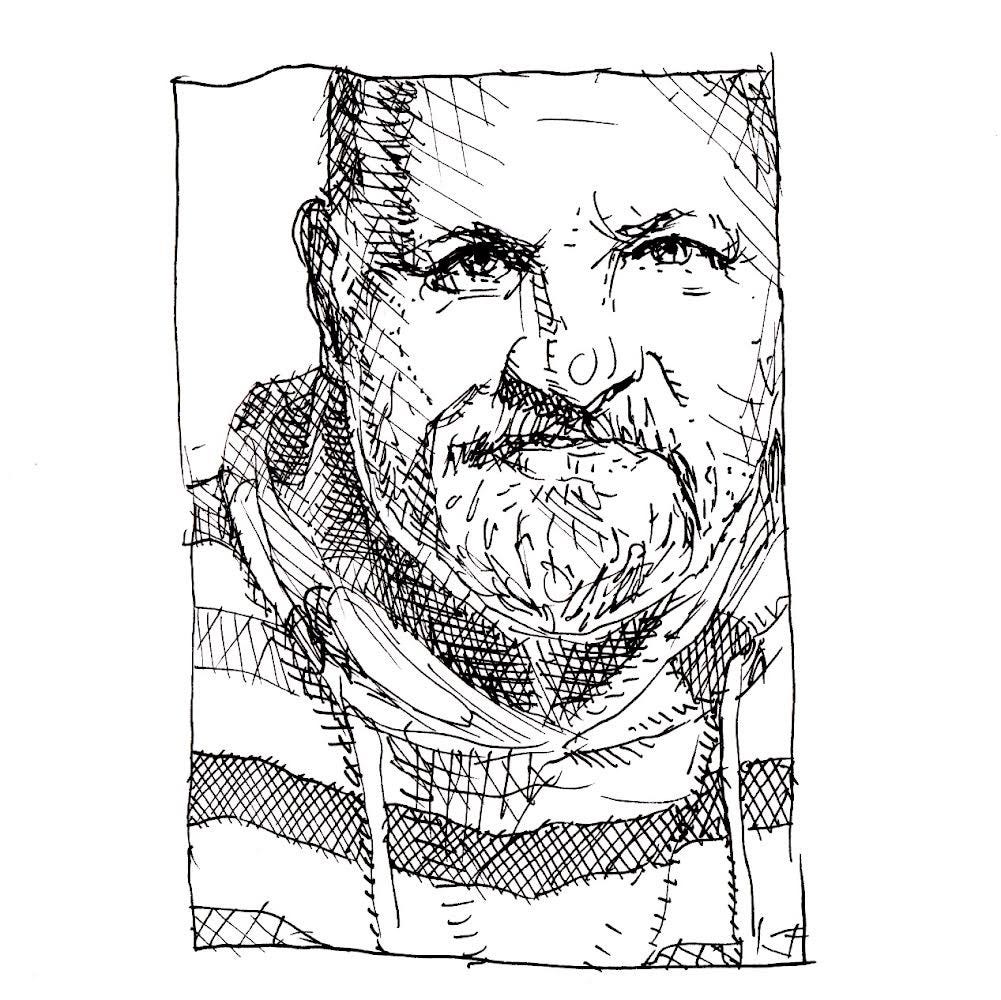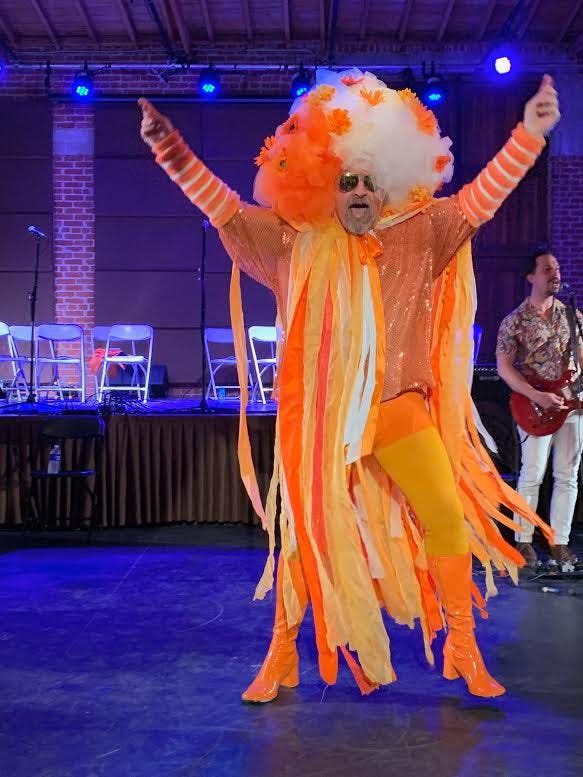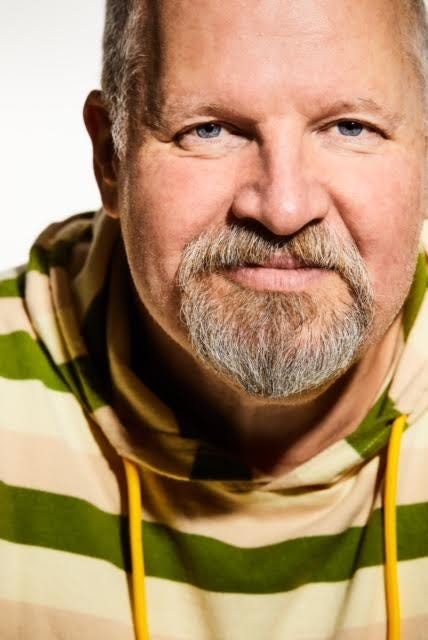Ask a Sober Oldster #14: Chris Wells
"The actions of forgiveness, acceptance and letting go are crucial. I do them imperfectly, and will practice them—imperfectly—until I die."
This monthly interview series is a collaboration between Oldster Magazine and The Small Bow, A.J. Daulerio’s excellent newsletter about recovery and mental health, and will appear in both newsletters. Learn more about this collaboration in this Oldster podcast/videocast episode.

CHRIS WELLS is an Obie award-winning actor, writer, teacher and community leader. As founder of The Secret City, a secular church of art, Wells has created joyful and transcendent community gatherings for thousands of people. As an actor, Wells has developed and performed original work with companies such as The Actors’ Gang, SITI Company, Cornerstone Theater Company and performed regionally all around the country. Wells leads weekly online writing workshops for writers of all kinds, coaches individual writers and has created writing and storytelling workshops for OMEGA Institute, LACMA, The Actors’ Center and more. The podcast Big & Salty features Wells telling his stories before a live audience. Chris lives with his husband, the painter Robert Lucy, and their dog Sally. He just finished his first novel. Check out his newsletter, .
—
How old are you, and how long have you been in recovery?
I just turned 60. I stopped drinking and smoking thirty years ago. I’ve dealt with lots of other substances and addictive behaviors at various times since then.
How did you get there?
I was 30 years old and doing a play in Los Angeles. I was a problem drinker by then and it was a very boozy cast. I had gone out to a party after one of our Saturday performances. The next morning I woke up with yet another terrible hangover and I realized there was nothing more for me to learn from drinking. I stopped that day.
It’s a paradox. The best things about not being a drunk are: I am able to leave (the party, the conversation, the dysfunctional relationship) when I want, and I am able to stay (in a monogamous relationship, with meaningful work, through difficult and challenging passages) when I want.
What are the best things about being in recovery?
It’s a paradox. The best things about not being a drunk are: I am able to leave (the party, the conversation, the dysfunctional relationship) when I want, and I am able to stay (in a monogamous relationship, with meaningful work, through difficult and challenging passages) when I want.

What’s hard about being in recovery?
Relentless mundanity. Finding ways to escape the traps of the mind. Meditation helps. And music. And time spent with friends. Engaging with the arts, as maker and audience.
Eighteen years ago, when I met and fell in love with the man who is now my husband, I was keenly aware that I was able to be with him, to say yes to love, and to build a long-term relationship, because I had been in recovery for over ten years at that point.
How has your character changed? What's better about you?
I am less of a child than I used to be. I rely less on other people to make a place for me in the world. I don’t wait for things I want to happen. I’m less helpless. I show up for the people and things in my life. I also have learned/am still learning, to be more compassionate toward myself and others.
What do you still need to work on? Can you still be a monster?
Ha. Yeah. For sure. I still need to work on my anger, my impatience, my judgment of other people. When I lived in NYC, I used to joke that I got into a hundred silent arguments just walking up Eighth Avenue. And honestly, many of the arguments weren’t silent. I was recently diagnosed with ADHD and it’s been wild—and very helpful—to learn about emotional dysregulation as well as the connection between ADHD and addictive behaviors.
Listen to a Chris Wells telling a story from his drinking days on his podcast:
What’s the best recovery memoir you’ve ever read? Tell us what you liked about it.
Hunger by
is an extraordinary telling of how a person responds to extreme trauma and finds a way to create safety for herself, and how that “safety” ends up being something of a trap. As someone who’s dealt with food issues and an eating disorder for most of my life, I admire how Gay grapples with her past traumas, as well as her own life choices. She documents a thorny, complicated life in ways that feel real and deeply intelligent.What are some memorable sober moments?
Eighteen years ago, when I met and fell in love with the man who is now my husband, I was keenly aware that I was able to be with him, to say yes to love, and to build a long-term relationship, because I had been in recovery for over ten years at that point.
The first time I sought a prescription for antidepressants I was sent to see a doctor who lived in a beautiful house in the hills overlooking the San Fernando Valley…Toward the end of our meeting I asked him if he took the medication he prescribed. “Yes,” he said. “Does it work?” “Yes,” he said. Then he said there are two ways that people get better: one is by working on themselves (meds, therapy, recovery, etc) and the other is by someone loving them. “Preferably, you have both.”
Are you in therapy? On meds? Tell us about that.
Yes and yes. The combo of a recovery program plus outside therapy is the sweet spot for me. I respond very well to therapy and have done a ton of different modalities over the years: EMDR, Somatic Experiencing, etc. And, re meds: The first time I sought a prescription for antidepressants I was sent to see a doctor who lived in a beautiful house in the hills overlooking the San Fernando Valley. We sat out on his terrace with a sparkling pool and a great view of the valley below. We talked and he asked me questions about my life—it felt more like a get-to-know-you chat than an intake. Toward the end of our meeting I asked him if he took the medication he prescribed. “Yes,” he said. “Does it work?” “Yes,” he said. Then he said there are two ways that people get better: one is by working on themselves (meds, therapy, recovery, etc) and the other is by someone loving them. “Preferably, you have both.”
What sort of activities or groups do you participate in to help your recovery? (i.e. swimming, 12-step, meditation, et cetera)
My latest group activity, which is both a joy and a workout, and a great way for me to express some of my deeply competitive nature, is to play aqua volleyball several times a week at the YMCA. I am an inconsistent member of an online meditation group, which brings peace. I also love house music and dancing, as I have since I was a budding gay boy, just without the substances now. But just putting in my AirPods and playing dance music or electronics or house or power pop can have a radical impact on my state of mind.
Are there any questions we haven’t asked you that you think we should add to this? And would you like to answer it?
Hm. There’s something missing about forgiveness. Have you been able to forgive yourself? To accept yourself for who you are and the choices you’ve made? And have you forgiven others for being who they are, with their limitations? Are you able to accept life as it is? Not situations that shouldn’t be tolerated, but the particular life you were given and have gone on to create? Have you been able to let go of the painful pressures you adopted along the way? Have you found peace? What the 12 step programs call Serenity. I find it fleeting, but possible. And more often now than ever before. I’m still hardwired for reactivity and conflict and negative thinking. The actions of forgiveness, acceptance and letting go are crucial. I do them imperfectly, and will practice them—imperfectly—until I die.
Oh, one more thing: I have approached my addictions and compulsive behaviors in an unorthodox manner. My path has definitely included twelve-step programs, for which I have great respect, but I have at times bristled at those formal structures. One of my favorite slogans is, “take what you like and leave the rest.” It was helpful for me to hear that early on; it allowed me to stay, and to find a way that worked for me. At times, I have felt self conscious about not doing recovery “right.” But for the past thirty years, I have found a path forward, not a poster boy for anything other than my own life. As Krishamurthi once wrote: “Truth is a pathless land.”







Good one!
Love love love what Chris responded with to ‘what are the best things about being in recovery’